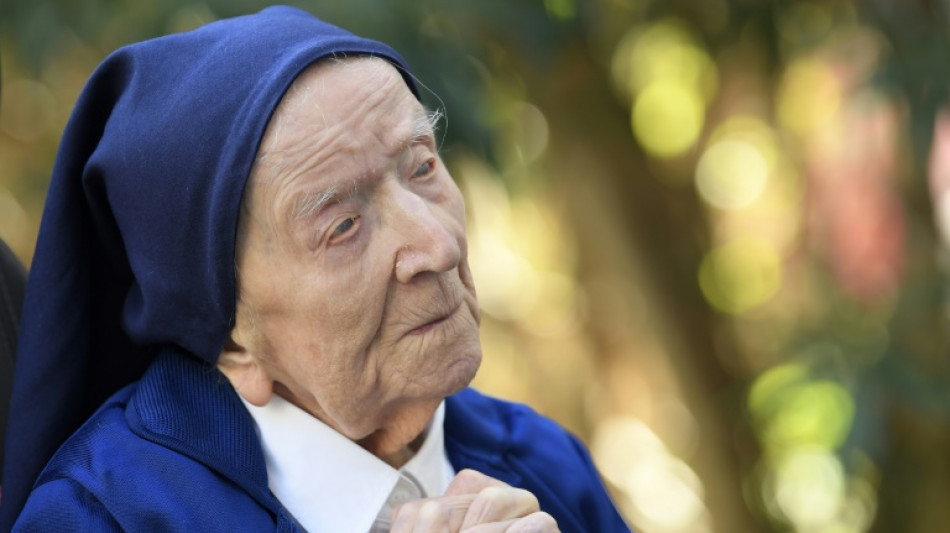
-
 Giannis triumphant in NBA return as Spurs win streak ends
Giannis triumphant in NBA return as Spurs win streak ends
-
How company bets on bitcoin can backfire

-
 Touadera on path to third presidential term as Central African Republic votes
Touadera on path to third presidential term as Central African Republic votes
-
'Acoustic hazard': Noise complaints spark Vietnam pickleball wars

-
 Iraqis cover soil with clay to curb sandstorms
Iraqis cover soil with clay to curb sandstorms
-
Australia's Head backs struggling opening partner Weatherald

-
 'Make emitters responsible': Thailand's clean air activists
'Make emitters responsible': Thailand's clean air activists
-
Zelensky looks to close out Ukraine peace deal at Trump meet

-
 MCG curator in 'state of shock' after Ashes Test carnage
MCG curator in 'state of shock' after Ashes Test carnage
-
Texans edge Chargers to reach NFL playoffs

-
 Osimhen and Mane score as Nigeria win to qualify, Senegal draw
Osimhen and Mane score as Nigeria win to qualify, Senegal draw
-
Osimhen stars as Nigeria survive Tunisia rally to reach second round

-
 How Myanmar's junta-run vote works, and why it might not
How Myanmar's junta-run vote works, and why it might not
-
Watkins wants to sicken Arsenal-supporting family

-
 Arsenal hold off surging Man City, Villa as Wirtz ends drought
Arsenal hold off surging Man City, Villa as Wirtz ends drought
-
Late penalty miss denies Uganda AFCON win against Tanzania

-
 Watkins stretches Villa's winning streak at Chelsea
Watkins stretches Villa's winning streak at Chelsea
-
Zelensky stops in Canada en route to US as Russia pummels Ukraine

-
 Arteta salutes injury-hit Arsenal's survival spirit
Arteta salutes injury-hit Arsenal's survival spirit
-
Wirtz scores first Liverpool goal as Anfield remembers Jota

-
 Mane rescues AFCON draw for Senegal against DR Congo
Mane rescues AFCON draw for Senegal against DR Congo
-
Arsenal hold off surging Man City, Wirtz breaks Liverpool duck

-
 Arsenal ignore injury woes to retain top spot with win over Brighton
Arsenal ignore injury woes to retain top spot with win over Brighton
-
Sealed with a kiss: Guardiola revels in Cherki starring role

-
 UK launches paid military gap-year scheme amid recruitment struggles
UK launches paid military gap-year scheme amid recruitment struggles
-
Jota's children join tributes as Liverpool, Wolves pay respects

-
 'Tired' Inoue beats Picasso by unanimous decision to end gruelling year
'Tired' Inoue beats Picasso by unanimous decision to end gruelling year
-
Thailand and Cambodia declare truce after weeks of clashes

-
 Netanyahu to meet Trump in US on Monday
Netanyahu to meet Trump in US on Monday
-
US strikes targeted IS militants, Lakurawa jihadists, Nigeria says

-
 Cherki stars in Man City win at Forest
Cherki stars in Man City win at Forest
-
Schwarz records maiden super-G success, Odermatt fourth

-
 Russia pummels Kyiv ahead of Zelensky's US visit
Russia pummels Kyiv ahead of Zelensky's US visit
-
Smith laments lack of runs after first Ashes home Test loss for 15 years

-
 Russian barrage on Kyiv kills one, leaves hundreds of thousands without power
Russian barrage on Kyiv kills one, leaves hundreds of thousands without power
-
Stokes, Smith agree two-day Tests not a good look after MCG carnage

-
 Stokes hails under-fire England's courage in 'really special' Test win
Stokes hails under-fire England's courage in 'really special' Test win
-
What they said as England win 4th Ashes Test - reaction

-
 Hong Kongers bid farewell to 'king of umbrellas'
Hong Kongers bid farewell to 'king of umbrellas'
-
England snap 15-year losing streak to win chaotic 4th Ashes Test

-
 Thailand and Cambodia agree to 'immediate' ceasefire
Thailand and Cambodia agree to 'immediate' ceasefire
-
Closing 10-0 run lifts Bulls over 76ers while Pistons fall

-
 England 77-2 at tea, need 98 more to win chaotic 4th Ashes Test
England 77-2 at tea, need 98 more to win chaotic 4th Ashes Test
-
Somalia, African nations denounce Israeli recognition of Somaliland

-
 England need 175 to win chaotic 4th Ashes Test
England need 175 to win chaotic 4th Ashes Test
-
Cricket Australia boss says short Tests 'bad for business' after MCG carnage

-
 Russia lashes out at Zelensky ahead of new Trump talks on Ukraine plan
Russia lashes out at Zelensky ahead of new Trump talks on Ukraine plan
-
Six Australia wickets fall as England fight back in 4th Ashes Test

-
 New to The Street Show #710 Airs Tonight at 6:30 PM EST on Bloomberg Television
New to The Street Show #710 Airs Tonight at 6:30 PM EST on Bloomberg Television
-
Dental Implant Financing and Insurance Options in Georgetown, TX


How long can a healthy human live?
The death of the world's oldest person at the age of 118 has reignited a debate that has divided scientists for centuries: is there a limit on how long a healthy human can live?
After French nun Lucile Randon died last week, Spanish great-grandmother Maria Branyas Morera, 115, has assumed the title of the oldest living person, according to Guinness World Records.
Back in the 18th century, French naturalist Georges-Louis Leclerc, known as the Comte de Buffon, theorised that a person who had not suffered an accident or illness could live for a theoretical maximum of 100 years.
Since then, medical advancements and improving living conditions have pushed the limit back by a couple of decades.
A new milestone was reached when Frenchwoman Jeanne Calment celebrated her 120th birthday in 1995.
Calment died two years later at the age of 122. She remains the oldest person ever to have lived -- that has been verified, at least.
According to the United Nations, there were an estimated 593,000 people aged 100 years or older in 2021, up from 353,000 a decade earlier.
The number of centenarians is expected to more than double over the next decade, according to the Statista data agency.
The Comte de Buffon might also have been surprised by the rise of supercentenarians -- people aged 110 or over -- whose numbers have been increasing since the 1980s.
- Natural limit at 115? -
So how far could we go? Scientists disagree, with some maintaining that the lifespan of our species is limited by strict biological constraints.
In 2016, geneticists writing in the journal Nature said there had been no improvement in human longevity since the late 1990s.
Analysing global demographic data, they found that the maximum human lifespan had declined since Calment's death -- even though there were more elderly people in the world.
"They concluded that human lifespan has a natural limit and that longevity is limited to around 115 years," French demographer Jean-Marie Robine told AFP.
"But this hypothesis is partly disputed by many demographers," said Robine, a specialist in centenarians at the INSERM medical research institute.
Research in 2018 found that while the rate of death increases with age, it slows down after 85.
Around the age of 107, the rate of death peaks at 50-60 percent every year, the research said.
"Under this theory, if there are 12 people aged 110, six will survive to be 111, three to be 112, and so on," Robine said.
- A numbers game -
But the more supercentenarians, the higher chance a few have to live to make it to record ages.
If there are 100 supercentenarians, "50 will live to be 111 years old, 25 to 112," Robine said.
"Thanks to a 'volume effect', there are no longer fixed limits to longevity."
However Robine and his team are publishing research this year which will show that the rate of death continues to increase beyond the age of 105, further narrowing the window.
Does this mean there is a hard ceiling on how long we can live? Robine will not go that far.
"We will continue to make discoveries, as we always have, and little by little the health of the oldest people will improve," he said.
Other experts are also cautious about choosing a side.
"There is no definitive answer for the moment," said France Mesle, a demographer at the French institute of demographic studies (INED).
"Even if they are increasing, the number of people reaching very old age is still quite small and we still cannot make any significant statistical estimate," she told AFP.
So it might be a matter of waiting for rising numbers of supercentenarians to test the "volume effect".
And of course some future medical breakthroughs could soon upend everything we know about death.
Eric Boulanger, a French doctor specialising in the elderly, said that "genetic manipulation" could allow some people to live for 140 or even 150 years.
Y.Aukaiv--AMWN



